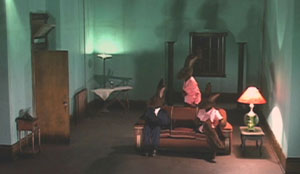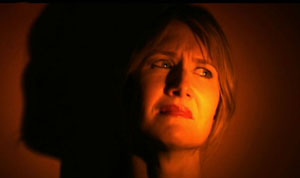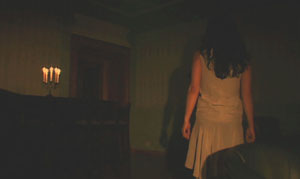|
David Lynch claims that he doesn't do drugs. Pardon me while I first laugh uproariously, and then get kind of quiet and contemplative, because the possibility that he's telling the truth begs the question, what would his films look like if he did do drugs? Suddenly, I feel worried. Is it conceivable that there's an even greater depth of insanity to which a film can go? 
This is a question which has, in one form or another, basically followed Lynch's films throughout his career. The man's "normal" films include titles such as The Elephant Man, Blue Velvet, and Wild at Heart. When he really decides to cut loose, such as with Mulholland Drive or Lost Highway, we see just how much he was restraining himself before, and figure we've now gone to the ends of his particular brain trip. But with this film, we see just how wrong we (hypothetically; I have no idea what you thought about it) were. There are no outer boundaries to strangeness. You can always take another step, and another. Inland Empire is a mystery so many layers deep it reminds one of an onion wearing lots of sweaters and cold weather gear; by the time you've gotten all the clothes off, you're left wondering what an onion is doing in there to begin with, and peeling back any more layers will likely just make you cry. We first see a record being cut with the accompanying narration, "Axxon n, the longest running radio play in history," making one question immediately if everything we're about to see is the story told by this non-visual medium. A young Polish girl, who appears to be turning what is likely her first trick, is left in her hotel room after her John has left, and watches a television which shows flashes of the film to come, and a program featuring people in rabbit suits who exchange stichomythic nonsense to an inappropriately timed laugh track. Before the five-minute mark, it's already weirder than anything in his last movie. We then see the comparatively normal setup of the story of Nikki Grace, an actress edging past her prime who's hoping to land a role in the upcoming production On High in Blue Tomorrows. A new neighbor stops by to ask if the role involves the topics of marriage and murder; Nikki confirms the former but denies the latter. The old woman insists that there is a murder in the film, which turns out to be true in a sense. Nikki and her notoriously womanizing co-star Devon are told by their director that the film is a remake of a never-finished European film titled simply "Four-Seven," which was never finished after both leads were murdered. Allegedly. 
At the risk of appearing to state that I've actually deduced the meaning of this labrynthine journey, it would seem as though the film is, at least in part, a cautionary tale about fidelity, an unusually conservative moral for a film by a man who's included a graphic sex scene in nearly every movie he's made for the past twenty years (although the one seen herein is far less cinematic, and almost creepily real). As the married actress Nikki and her co-star are drawn closer together, she begins to lose the ability to distinguish reality from the story of her film role. The day after the pair finally succumb and bed down together, she finds a door mysteriously marked "Axxon n," and passing through, finds herself trapped inside the world of her own movie, unable to escape. She watches as her bedroom transforms, quite literally, into a red-light district, and her filmic identity of Susan Blue begins a long, downward spiral towards prostitution and possibly death. 
Any attempt to describe further what happens would take pages and pages, much of which would prefaced with disclaimers of the "maybe" and "possibly" and "going out on a limb, one could conceivably say" sort. Lynch gives signposts to the viewer, but they're most often things like the name "Axxon n" scrawled on a wall, or recurring references to animals and the color red. He never does anything so prosaic as to actually tell us, in a clear and coherent way, what the fuck is going on. For many people, this is going to be a huge turn-off. It's not what we're used to, it's deliberately alienating, and it makes us think way too much. This is America, dammit! When the hell did thinking get put on the menu? The scenes become far less clear and linear as the film progresses, the flashbacks to the foreign version of the story increase and strangely overlap into the modern-day portions of the story, and Laura Dern, tasked with playing our principal, fades from one personality to another, seeming to be multiple characters on varying paths. All of this demands close attention and abstract thinking, and having to work at our entertainment isn't what most people are seeking in a theatrical diversion. It's going to remain within the narrower realm of people who enjoy puzzles to appreciate Inland Empire for what it is, or at least what it might be: an exploration of the consequences of poor choices? A look at the faux reality of film and our willingness to buy into it through multiples layers of abstraction? An attempt to film what Lynch sees when he does all of those drugs he says he doesn't do? I'm not here to tell you. It would require me to know already, and it'll take many more viewings before I can be so bold. Lynch shot the whole thing on digital video, declaring that he was through was the hassle of film forever. The resulting image is slightly grainier and less saturated than we've come to expect from professional productions, and the motion is occasionally odd-looking due to the conversion of 30 frames per second to 24. The most notable result of the new approach, however, is that the cheapness of video allowed the director to shoot as much as he wanted; there are ninety minutes of deleted scenes on the DVD, and the feature still clocks in at three hours, which might just be a little too long. The narrative is one of his least linear and clear, which can make the running time more trying than it would be for a film we felt we had a better handle on. But would I recommend it? Yes, though with the caveat that it's not my fault if you don't enjoy it-you've been amply warned in the above paragraphs. The film is a very interesting experience, possibly the most accurately dreamlike film ever. The surreal imagery is visually entrancing and imaginative (not to mention completely legal), and Laura Dern gives one hell of a performance. I'm not sure where in the Lynch filmography I'd rank this one; it's always possible, given the story's deliriously fractured state, that he really didn't have a specific meaning in mind. But it's still a mind that's far more interesting than most. -review by Matt Murray
|
|
||||||||